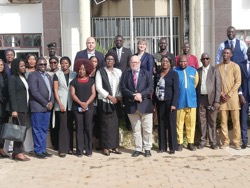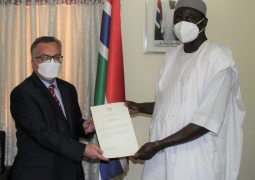
In recent years, the campaign towards the abolition of death penalty has seen 170 of the 193 United Nations countries abolishing the death penalty, according to officials.
Thus, as part of its mandate, the commission conducts research and issues periodic advisory note on prevailing human rights issues and proffers recommendations to government to ensure compliance with nation and international obligations of State.
In this regard, the NHRC has developed a comprehensive Advisory Note examining The Gambia’s obligation to abolish the death penalty in line with regional and international obligations.
Welcoming the gathering, Jainaba Johm, vice chairperson of NHRC, made reference to the fact that there is growing consensus towards the abolition of death penalty in many countries, saying this been fuelled by the respect for the rights to life and provision against torture and other cruel, inhumane and degrading treatment or punishment.
“In recent years, the campaign towards the abolition has seen a 170 of the 193 United Nations countries of the world abolishing the death penalty. It against this backdrop that the National Human Rights Commission sees itself as a key player in advancing the abolition of death penalty here within the Gambia.”
She reminded that their mandate is to promote and protect human rights, and also to advocate for and advise the government of the Gambia on certain issues and the abolition of the death penalty is one them.
She also spoke at length on some of the national and international instruments and protocols that The Gambia has ratified in promoting human rights, saying this was not enough as the death penalty is still part of the statute books even though a moratorium has been placed on it.
Deputysing for the Minister of Justice, Aji Adama Ceesay, curator of Interstate at the Ministry of Justice reminded that The Gambian legislations such as The Criminal Code, The Gambia Armed Forces Act and the Anti-Terrorism Act set out a number of offences that are punishable by death.
This, she added, includes offences such as murder, treason, aiding the enemy, mutiny with violence, acts of terrorism, adding that Section 18 of the 1997 Constitution provides for the protection of the
right to life.
“It states that no person shall be deprived of their life intentionally except in the execution of a sentence of death imposed by a court of competent jurisdiction in respect of a criminal offence for which the penalty is death under the Laws of The Gambia.”
She equally noted that Subsection (2) went further to state, "As from the coming into force of this Constitution, no court in The Gambia shall be competent to impose a sentence of death for any offence unless the sentence is prescribed by law and the offence involves violence, or the administration of any toxic substance, resulting in the death of another person.”
The Gambia, she added, has signed and ratified the Second Optional Protocol to the International Covenant on Civil and Political Rights, aimed at the abolishing the death penalty.
“On 7th August 2018, the President of the Republic, Mr. Adama Barrow, commuted the sentences of all persons currently sentenced to death to life imprisonment.”
She observed that despite efforts made by The Gambia Government, it is evident that there are still lacunas, and the complete removal of the death sentence in the country’s legislations will go a long way to demonstrate The Gambia’s commitment to the realisation and protection of fundamental rights in line with International standards.
In launch statement, Janet Sallah-Njie, commissioner, African Commission on Human and People’s Rights, pointed out that right to life is the foundation to all other rights, saying ‘we need to be alive to enjoy all other rights.’
She therefore calls for more awareness on the advisory note among the public, National Assembly and even eminent leaders.
“The right to life is universally recognised as fundamental human rights and is guaranteed Article four of the African Charter on Human and People’s Rights and all other global human rights instruments.”
Commissioner Sallah-Njie further revealed that Article 42J of the Protocol to the African Charter on Human and People’s and the Rights of Women in Africa calls on state to commit to ensuring in countries where it still exists, that the death penalty is not applied to pregnant and breastfeeding women.
She equally made reference to Articles that call for abolition of the death penalty for crimes committed by children, saying for over two decades, the African Commission on Human and People’s Rights has steered regional initiatives, aimed at abolishing the death penalty in Africa.
The jurisprudence of the African Commission has largely recognised the right to life as a fundamental right, without which, she said, other rights cannot be realised.
She thus calls on the Ministry of Justice and National Assembly to be more active in ensuring full the advisory note on the abolition of the death penalty in the country.




